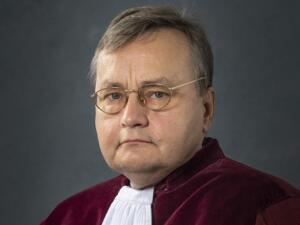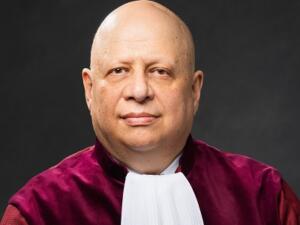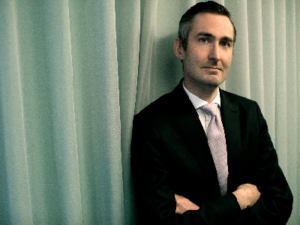CJEU reopens European cross-border litigation in BSH vs Electrolux ruling
Swedish Courts have jurisdiction to rule on infringement even for the non-Swedish parts of European patents. The CJEU handed down its ruling today in BSH Hausgeräte vs Electrolux. The judgment is far-reaching and could grant greater powers to the Unified Patent Court.
25 February 2025 by Mathieu Klos
BSH Hausgeräte has secured a significant victory at the Court of Justice of the European Union (CJEU). The Grand Chamber under president Koen Lenaerts ruled that courts in EU member states have jurisdiction over infringement of European patent parts not validated in Sweden. This applies even when defendants claim those parts may be invalid. The ruling centres on Article 24 Nr. 4 of the Brussels Ibis Regulation, though this does not apply to non-EU patents (case ID: C-339/22).
This morning, the President of the Ninth Chamber of the CJEU, Niilo Jääskinen, delivered the judgment in this high-profile patent dispute. The court’s rapporteur was Octavia Spineanu-Matei.
The judges ruled that Article 24/4 of the Brussels Ibis Regulation allows courts in EU member states where a defendant is domiciled to hear infringement actions, even when the patent was granted in another member state and the defendant has challenged its validity. While the case primarily concerns a European patent validated in several EPO states, the judges clarified that national courts retain exclusive jurisdiction over patent validity.
Courts can consider validity in infringement
The judgment states that “the regulation does not apply to a court of a third country”. This means EU courts cannot rule on the validity of European patents in non-EU EPO member states.
Nevertheless, EU courts can still decide on patent infringement matters involving third countries. The ruling explains, “Where a court of a Member State is seised of proceedings for infringement of a patent granted or validated in a third country on the basis of the Brussels Ibis Regulation, in the course of which the question of the validity of the patent is raised by way of a plea, the EU court has jurisdiction.”
- Niilo Jääskinen
- Octavia Spineanu-Matei
- Nicholas Emiliou
This means EU courts can assess the validity of European patents in third countries to determine infringement issues. However, their decisions will “affect neither the existence nor content of the patent in that third country nor result in any amendment to the national register of the third country”.
Wider implications for jurisdiction
With today’s judgment, the CJEU follows the second opinion of Advocate General Nicholas Emiliou in the case, published last September. The court typically aligns with the Advocate General’s views.
The patent community followed the proceedings closely. The ruling means the UPC or national courts in EU countries can now decide on infringements of patents of those states that are not in the EU but are members of the EPO. This could apply to Turkey or Switzerland but also for the UK, for example.
The ruling marks a shift from the CJEU’s GAT vs. LuK decision of 2006. Under that precedent, a cross-border injunction was blocked if defendants challenged the validity of the patent-in-suit. According to early analysis from experts, today’s ruling takes the opposite approach.
The ruling could strengthen the Unified Patent Court’s power to decide on infringement issues in non-UPC countries. However, central revocation actions at the new court against parts of European patents from third countries are likely to remain outside its remit.
The judgment stems from a Swedish referral. BSH and Electrolux have been fighting in Germany and Sweden since 2007. BSH’s infringement action in Sweden covers the German, Austrian, Spanish, French, UK, Italian, Dutch, Greek, and Turkish parts of EP 1 434 512, which protects vacuum cleaning technology. Electrolux had filed nullity suits against EP 512 in several countries, including Germany.
In the Swedish case, BSH seeks damages for past infringement in Sweden and nine other countries where the patent was valid, citing Article 4(1) of the Brussels Ibis Regulation. Electrolux argued for dismissal regarding foreign parts of EP 512, questioning their validity.
Swedish court can continue
After a first-instance court denied jurisdiction over non-Swedish parts of EP 512, BSH appealed. The Swedish Court of Appeal referred the question to the CJEU in May 2022.
Following Emiliou’s first opinion in February 2024, the CJEU decided to hear the case before the Grand Chamber — a step reserved for exceptionally important cases. This necessitated Emiliou’s second opinion in September 2024. The Swedish Court of Appeal can now continue proceedings on the jurisdictional challenge.
Nevertheless, Stockholm’s Patent and Trademark Court heard BSH’s infringement case against Electrolux regarding the Swedish part of EP 512 last September, excluding the nine patent parts central to the CJEU proceedings. The court then decided that BSH’s patent is invalid in Sweden and also denied infringement by Electrolux. BSH has since appealed to the Court of Appeal.
German case continues
In Germany, disputes between the two companies remain ongoing. Following extended litigation, the German Federal Court of Justice upheld EP 512 in its entirety (case ID: X ZR 19/21).
This allowed the Düsseldorf Regional and Higher Regional Courts to proceed with two infringement claims against Electrolux’s vacuum cleaners. One case concerned older models, while a newer case regarding more recent models is pending at Düsseldorf Regional Court. Both proceedings required expert testimony.
- Magnus Dahlman
- Roman Sedlmaier
Landmark win for Gulliksson and IPCGS
The ruling marks a significant victory for BSH and its legal representatives at Gulliksson and IPCGS. In the Swedish proceedings and CJEU case, BSH Hausgeräte relied on a patent team from Swedish full-service firm Gulliksson, led by partner Magnus Dahlman and Therese Grennard.
German litigator Roman Sedlmaier and patent attorney Jan Gigerich were the strategic architects behind the cases. The partners from Munich-based IP firm IPCGS coordinate BSH’s European strategy. Both Sedlmaier and Gigerich are also involved in the German proceedings.
- Björn Rundblom Andersson
- Christian Harmsen
For the CJEU and Swedish proceedings, Electrolux instructed litigation specialists Westerberg & Partners. Björn Rundblom Andersson led the case, supported by Jonas Westerberg and Petter Larsson. Electrolux’s German counsel Christian Harmsen of Bird & Bird also participated in the CJEU case.






